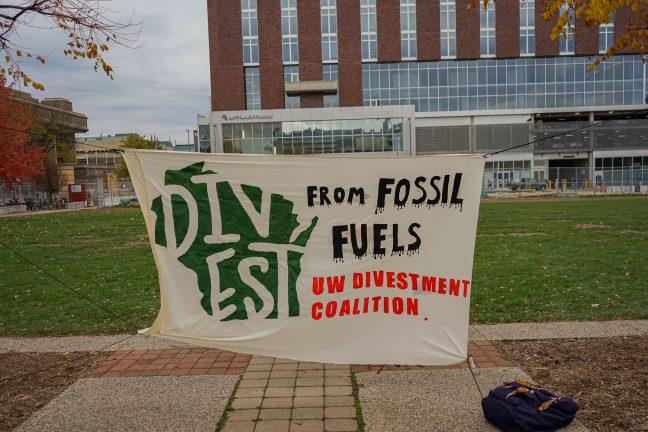In Dec. 2021, the University of Wisconsin Divestment Coalition held a day-long rally called Divestment Day of Action advocating for the Wisconsin Foundation and Alumni Association’s divestment from fossil fuels
The events of the day and its success has UW-Stevens Point senior and Divestment Coalition co-founder Molly McGuire excited and hopeful for the future.
“The biggest part of that event, in terms of the success, was the relationship that was built between the Board of Regents and the coalition through having our direct action where we were sitting in the audience,” McGuire said.
An important part of the Divestment Day of Action was the coalition’s attendance and protest during a Board of Regents meeting, where students stood in solidarity, holding up various signs, such as “System change not climate change,” according to the Cap Times.
The UW Divestment Coalition is a student-run organization composed of members from across the UW System. The organization calls for four key things: transparency and disclosure of all investments by the WFAA, the immediate end of new investment in oil, gas and coal companies, the sale of all existing investments in those areas over the next three to five years, and the investment in clean energy solutions, according to the organization’s website.
ASM passes legislation urging Blank to commit to 100% renewable energy by 2035
As a result of their day of action, the UW Divestment Coalition is in direct contact with the UW Board of Regents and plans to have a one-on-one meeting with the Regents Board President Edmund Manydeeds III, McGuire says.
UW System Media Relations Director Mark Pitsch said in an email statement to The Badger Herald said that a meeting between the coalition and the Board of Regents has officially been scheduled.
This direct line to the top of UW System leadership seems to be the core focus of the UW-Divestment Coalition for the time being, McGuire said.
“We are mostly focused on this upcoming meeting … it’s going to be a zoom call with a variety of students from across the state that represent different sustainability organizations,” McGuire said.
The WFAA is a private nonprofit associated with the UW System that seeks donations and gifts from alumni and organizations to help financially support the UW System, according to their website.
WFAA Media and Public Relations Director Tod Pritchard declined to accept the Badger Herald’s interview request but supplied a document with the WFAA’s statement and opinion on the recent calls for divestment by students. According to the statement, a committee of investors and the WFAA board approve all investment decisions defined within a set of eligible options.
The team at WFAA doesn’t select individual stocks but instead hires outside managers to invest their funds for them. Then, the WFAA invests those financial gifts into various stocks in hopes of producing more revenue, the statement said.
Nontraditional student rates could rise as result of programs expanding during pandemic
The WFAA has donated over $60 million to environmentally-focused departments and initiatives on the UW-Madison campus and has internally worked to operate as a sustainable company by encouraging better lighting and temperature use, using sustainable materials and asking employees to drive less by providing incentives.
From 2019 to 2020, the UW-Madison branch of WFAA raised $454.2 million for the UW System, accounting for 18% of UW-Madison’s budget alone.
The UW Divestment Coalition was founded in 2020 right when the coronavirus pandemic hit the U.S., McGuire said. It was then McGuire said she realized the decision to divest was not up to individual schools.
“We quickly came to the conclusion that the way our system works is that if Stevens Point were to divest, it would have to be a system wide effort,” McGuire said.
The UW Divestment Coalition has not fought alone for divestment — they’ve partnered with groups from all across the state, including Associated Students of Madison, Clean Leaders for Energy Action Now, 350 Madison and the Wisconsin Student Climate Action Coalition, according to an article by the Cap Times.
Beyond their main hopes and goal of ending the WFAA’s investment in fossil fuels, McGuire says the UW Divestment Coalition is proud and excited about more action.
“I’ve realized that the professionals within the system underestimate how passionate students really are about progressing our universities and moving the state in a sustainable direction,” McGuire said. “I think that’s a huge outcome for me — that people recognize we are really passionate and motivated and that divestment is one thing that we can be doing, but there’s so many things we can do.”














